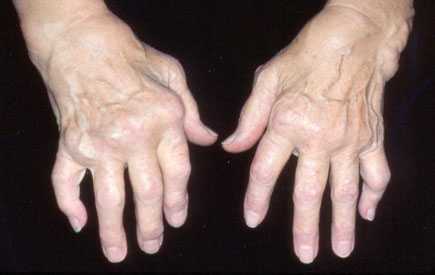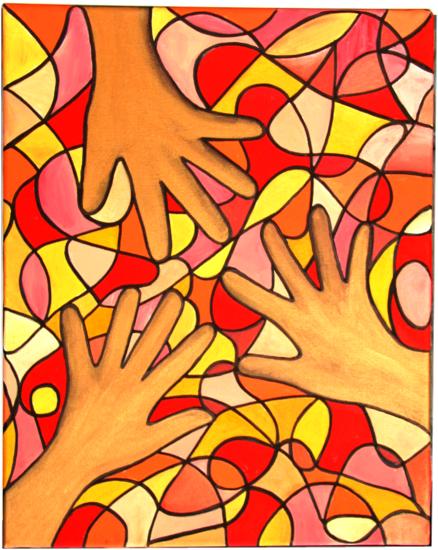|
trained-pianist
|
 |
« Reply #555 on: 20:49:00, 13-05-2007 » |
|
I am reading about arthritis. It is normal for joints to deteriorate and my friend tells me that pianists have a good blood circulation in their hands. It is good for our hands to play. I am just afraid. I am looking at all this pictures.  Arthur Rubinstein and Horowitz played to their old age. The damp climate is not good for joints and muscles. One has to take minerals to keep the body in good shape (and vitamins too). In Italy I saw old people also have arthritis. Dumpness makes my hands very cold. Now I have to put this picture of healing here because the hands make it so scary.  |
|
|
|
« Last Edit: 20:54:21, 13-05-2007 by trained-pianist »
|
 Logged
Logged
|
|
|
|
|
marbleflugel
|
 |
« Reply #556 on: 21:02:41, 13-05-2007 » |
|
I'm sure Johnathan won't mind my mentioning that he has similar issues right now. I think Chakra balancing,
Alexander technique etc-balancing the whole body-may help. My angle is of an occasional piano player,
more and more a report/ proposal / general writer, and sometime trombonist (Gustav Holst took up the trombone on Doctor's advice to cure his Neuritis). The balance of the instrument on the shouldersis a big design issue still.
I remember \finding 'The Art Of Touch' by a victorian piano pedagogue (forgotten his name for now) where he talks about exercising the whole arm by practicing with a wooden spoon or somesuch before going to the keyboard.
Presumably Victorian damp was an issue in this too-plus ca change!
|
|
|
|
|
 Logged
Logged
|
'...A celebrity is someone who didn't get the attention they needed as an adult'
Arnold Brown
|
|
|
|
trained-pianist
|
 |
« Reply #557 on: 21:11:41, 13-05-2007 » |
|
I never heard anything about spoon, marbleflugel. I am prone to panic attack and my nerves are kind of unsettled at the moment. I never had any problems with my hands and my doctor friend thinks that I don't have any. Nevertheless I am panicing because I have muscle spasm in my legs and my hand takes a long time to warm up. Today I had difficult time to keep them warm and as a result did not practice much. You are very kind to respond. I think chakras and other methods are good to settle nerves a little. But what about the spoon? How can one use a wooden spoon. I don't think I have a wooden spoon in the house. I have a spatula. Will it be good too? This is a good picture of healing hands.  |
|
|
|
« Last Edit: 21:26:20, 13-05-2007 by trained-pianist »
|
 Logged
Logged
|
|
|
|
|
marbleflugel
|
 |
« Reply #558 on: 21:29:35, 13-05-2007 » |
|
I'm trying to remember the exercise and the author....ah yes,it was Tobias Matthay 'The Art of touch'. Lost the book unfortunately, but I'll do some research if you like t-p. I think the spoon was to put some weight on the muscles gripping it while flexing the wrists and upper arm in an arc. He was trying to focus on particular muscles but i can't remember which. I think the book was reprinted and may be quoted from in some other keyboard technique books? I'd reccomend a Chakra/ Hot Stones massage for your legs and the rest of you if you can find a practicioner where you are. Good luck, and don't worry too much-youre a survivor!  |
|
|
|
|
 Logged
Logged
|
'...A celebrity is someone who didn't get the attention they needed as an adult'
Arnold Brown
|
|
|
|
trained-pianist
|
 |
« Reply #559 on: 21:33:22, 13-05-2007 » |
|
I think I read this book, but I could not understand much. I thnk I was too young when I read it. Also I find his language tiresome. I definately think that he is very good teacher. Images work best for me than a long explanations.
thank you marbleflugel for your explanation. It does make sense to me. I am going to try to invent something myself. It is just that I can not keep dump cold from my hands. I think this house is badly built. We have one dehumidifier in piano room.
Some times I feel defited.
|
|
|
|
|
 Logged
Logged
|
|
|
|
|
John W
|
 |
« Reply #560 on: 22:52:56, 13-05-2007 » |
|
We have one dehumidifier in piano room.
Some times I feel defited.
t-p, You've got me there, I can usually work out what you're trying to say but I can't figure out what a dehumidifier is doing to you. Ah, just as I post I see, defeated  You are always too defeatist on here t-p, please cheer up and thank the world for the talent that you have  |
|
|
|
|
 Logged
Logged
|
|
|
|
|
trained-pianist
|
 |
« Reply #561 on: 22:56:20, 13-05-2007 » |
|
Thanks John W. I think I am going to stay away for a while.
|
|
|
|
|
 Logged
Logged
|
|
|
|
|
Tony Watson
Guest
|
 |
« Reply #562 on: 23:04:07, 13-05-2007 » |
|
I nearly bought a clarinet in C today. I had been told that a lady had one to sell, second-hand. She and I knew that it had originally been bought new for £700. When I asked how much she wanted for it she said that she wanted to go away and do some research to find its true worth. I thought that it's not like it's a special violin worth many thousands. It's only a student model and the £700 price gives a fair indication of its value now. Clarinets don't improve with age. I had been prepared to buy it there and then but she said she'd get back to me. Don't expect me to wait by the phone, I thought.
|
|
|
|
|
 Logged
Logged
|
|
|
|
|
John W
|
 |
« Reply #563 on: 23:07:49, 13-05-2007 » |
|
Our local Cashconverters shop usually has a clarinet for sale, the price is usually for about £50-£100. Would they be B flat?
|
|
|
|
|
 Logged
Logged
|
|
|
|
|
Tony Watson
Guest
|
 |
« Reply #564 on: 23:12:46, 13-05-2007 » |
|
Almost certainly B flat, I'd say, and models that had originally cost about £300. Special plastic clarinets in C were made for children, being a bit smaller and lighter, and perhaps they still are but this was a conventional clarinet. I play in an amateur orchestra and it's surprising how often the C is written for and I thought it would be nice not to have to play it on the B flat transposing at sight, as most other clarinettists do. The pieces that call for the C that I've been involved in recently are Schubert's 9th symphony, Berlioz's Symphonie Fantastique, Smetana's Vltava and Schubert's Octet.
|
|
|
|
|
 Logged
Logged
|
|
|
|
|
John W
|
 |
« Reply #565 on: 23:19:56, 13-05-2007 » |
|
Transposing at sight? Yikes! ( I have trouble reading one line of music). Is that like what I do when I change from treble to tenor recorder, different fingering for the same notes?
John
|
|
|
|
|
 Logged
Logged
|
|
|
|
|
Tony Watson
Guest
|
 |
« Reply #566 on: 23:24:58, 13-05-2007 » |
|
Similar but different. It means having to play one note higher than written. It's interesting that you mention treble and tenor recorders because the fingering on a clarinet is like a treble for the low notes and a tenor for the high ones.
|
|
|
|
|
 Logged
Logged
|
|
|
|
|
John W
|
 |
« Reply #567 on: 23:32:44, 13-05-2007 » |
|
Similar but different. It means having to play one note higher than written. Oh, that would flummox me  It's interesting that you mention treble and tenor recorders because the fingering on a clarinet is like a treble for the low notes and a tenor for the high ones.
Hmm, I could probably have a go then, never played a reed instrument  |
|
|
|
|
 Logged
Logged
|
|
|
|
|
MabelJane
|
 |
« Reply #568 on: 23:38:10, 13-05-2007 » |
|
Transposing at sight? Yikes! ( I have trouble reading one line of music). Is that like what I do when I change from treble to tenor recorder, different fingering for the same notes?
John
I should think it's much harder than that John. I can switch from treble to tenor quite easily whereas transposing at sight must be really quite a challenge. I really struggled if I played emergency viola as a child when one was required in a string quartet (just playing for fun I hasten to add). As I'd only learned the violin, I was working out the notes and fingerings as I went along...I still don't understand why viola clef had to be invented with the middle line being C - how my poor brain ached with the effort! Our Youth Orchestra was so short of violas I was persuaded to play in that so I did improve a bit through necessity and I did enjoy the rich dark sound of the viola compared to my squawks on the violin.  |
|
|
|
|
 Logged
Logged
|
Merely corroborative detail, intended to give artistic verisimilitude to an otherwise bald and unconvincing narrative.
|
|
|
|
harmonyharmony
|
 |
« Reply #569 on: 15:55:19, 14-05-2007 » |
|
Transposing at sight is just one of those skills that you pick up.
It's a lot easier to pick up if you start early. Our primary school orchestra was conducted by the headmaster and, despite his best efforts, it usually ended up with me having a part in C to play on a Bb clarinet.
Once you get into the habit, it can be quite easy to do weird things like play an A clarinet part on a Bb clarinet (because you can't really afford another clarinet) or an Eb part. After all, horn and trumpet players do it all the time.
|
|
|
|
|
 Logged
Logged
|
'is this all we can do?' anonymous student of the University of Berkeley, California quoted in H. Draper, 'The new student revolt' (New York: Grove Press, 1965) http://www.myspace.com/itensemble |
|
|
|

